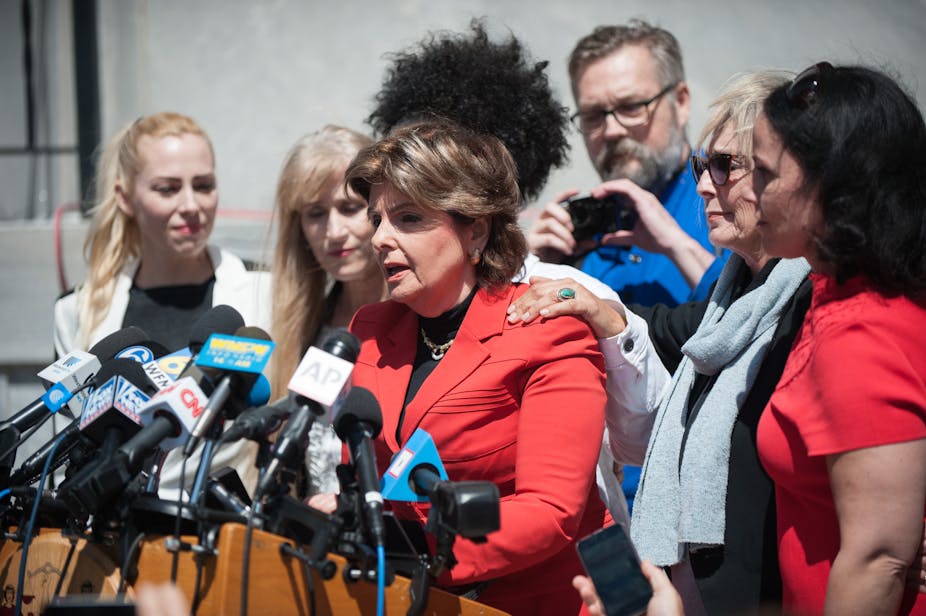
So much has happened in three and a half years: several abusive men have been exposed, the #MeToo and #TimesUp movements have gone international, millions have marched, and now an actual conviction for a man who appeared impervious to justice – a man protected by producers, high-profile friends, and fans.
So much has happened it is easy to forget the video that circulated on social media of comedian Hannibal Buress calling out Bill Cosby in his stand-up routine: “Yeah, but you rape women, Bill Cosby, so turn the crazy down a couple notches …” he said in October 2014. Over the years, Buress has criticised Cosby, but it wasn’t until the video of him went viral that things began to change.
Buress importantly brought attention to Cosby – but he is not the reason for the changing media coverage and ultimately Cosby’s conviction. It’s actually all the brave women who have come forward that have forced the news and entertainment industries to pay attention.
Shortly after the Buress video went viral, actress Barbara Bowman frustratedly asked in The Washington Post: “Why did it take 30 years for people to believe my story?”, pointing to the double standards of taking men seriously but not women. Even so, it is what the 60-plus women who have come forward against Cosby have faced that has finally forced the public and media outlets to care about the systemic sexual violence perpetrated by some powerful men like him.
https://twitter.com/HadleyFreeman/status/989567914058698752
Remember when CNN host Don Lemon asked one Cosby accuser Joan Tarshis why she didn’t just bite Cosby’s penis? Well he doesn’t ask questions like that anymore. Or when Canadian basketball star Andrea Constand originally took Cosby to court in 2005 and no one paid attention? Well the jury certainly paid attention to Costand this time around. Or when supermodel Janice Dickinson went on The Howard Stern Show in 2006 and only hinted about Cosby’s behaviour because she was too afraid of being sued to say more? She has now spoken publicly to many news outlets and even testified in this last fateful trial.
But even with the improvements, news media still need to do better when it comes to interviewing and profiling women who come forward. Rape culture that is so common in societies, still plays out in news coverage. Specifically, women who come forward are doubted and disparaged. And powerful people who question, insult, and dismiss accusers coming forward are given ample attention in the coverage.
When the Access Hollywood tape was released, featuring Donald Trump‘s unsavoury comments about grabbing women by the pussy, Trump was given carte blanche to call the women coming forward to accuse him of harassment liars and ugly and threaten to sue them. The women who accused Trump on the other hand, have always been given minimal exposure. Actor Daman Wayans famously stated that some of the women accusing Cosby were “un-rape-able”. Trump, of course, subsequently won the 2016 presidential election.
Meanwhile Fox presenter Bill O’Reilly, sacked from Fox News amid allegations of sexual harassment – said for years that he was merely a target for opportunistic women, with little push back. The examples go on.
Proving credible
Consequently, when interviewed, accusers/survivors are often forced to “prove” themselves rather than just tell their story. Or worse, are asked – Like Lemon did to Tarshis – why didn’t they just prevent this from happening? They have to justify their previous actions and even their character traits, which research shows does not determine whether or not a woman is assaulted.
When the Cosby story broke three and a half years ago, former co-star Phylicia Rashad notably said “… this was not about the women. This is about something else. This is about the obliteration of legacy”. Jerry Seinfeld said something similar about the value of Cosby’s body of work – although to be fair he later went back on those comments.
But in the end, the women in this case finally (and rightfully) made it about them. News coverage reflected this – even if they were 30 years late. Moving forward the biggest challenge will be making this the norm and not just the exception.
News coverage of the #MeToo movement that began in the wake of Harvey Weinstein’s demise, has often played devil’s advocate, asking (and sometimes emphatically stating) it has gone too far. This is without considering the international systemic problem of physical and sexual violence against women. Or the relatively short time the movement has existed as opposed to centuries of gender inequality. More context is needed when we read the news.
Also, more attention must be paid to surviving sexual abuse and misconduct, rather than the triumphant comeback stories that are now in the works for accused harassers, such as the disgraced CBS anchor Charlie Rose and former Today host Matt Lauer.
![]() While recent news coverage has finally embraced reporting on sexual abuse allegations, there is still far to go before the issue itself and the problematic way we discuss all forms of violence against women is eradicated. Luckily, this didn’t deter the brave women who helped bring Cosby to justice.
While recent news coverage has finally embraced reporting on sexual abuse allegations, there is still far to go before the issue itself and the problematic way we discuss all forms of violence against women is eradicated. Luckily, this didn’t deter the brave women who helped bring Cosby to justice.
Lindsey Blumell, Lecturer in Journalism, City, University of London
This article was originally published on The Conversation.


Leave a Reply